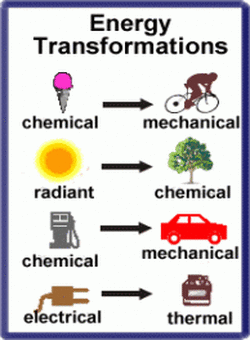 Secondary
Primary
Home
☰
Secondary
Primary
Home
☰
Click on the interactive link above to see how Potential and Kinetic energy fluctuate in real time.
Source: PHET, URL: https://phet.colorado.edu/sims/html/energy-skate-park-basics/latest/energy-skate-park-basics_en.html
Potential energy is a form of 'stored' or 'hidden' energy.
There are three forms of potential energy - chemical, elastic and gravitational.
Source: 123RF, URL: https://www.123rf.com/photo
Gravitational energy is the energy stored in an object due to its height above the Earth (e.g. if it's further away or closer to the ground). It is a form of potential energy.
Source: Socratic Q&A, URL: https://socratic.org/questions/is-there-any-difference-between-gravitational-force-and-gravitational-energy-wha
Energy Transformation
The Law of Conservation of Energy states that energy cannot be created nor destroyed. Instead, it must be transformed into another type of energy.
Source: https://www.brainpop.com/science/energy/formsofenergy/

Source: Blendspace, URL: https://www.blendspace.com/lessons/rL4wCgdyTyC-MQ/forms-of-energy
Energy rules - the conservation of energy and momentum
Source: ClickView, 2006, Duration 22:13, URL: https://online.clickview.com.au/libraries/videos/3715933/energy-rules-the-conservation-of-energy-and-momentum
Kinetic energy is the energy of a moving object.
Kinetic energy depends on the mass and velocity of an object.
Source: 123RF, URL: https://www.123rf.com/photo
Chemical energy is the potential energy stored in the arrangement of atoms within molecules.
Source: CK - 12 Foundation, URL: https://www.ck12.org/c/chemistry/chemical-potential-energy/lecture/Chemical-Potential-Energy-%E2%80%93-Science-For-Kids/
The efficiency of a device is the proportion of the energy supplied that is transferred in useful ways. The efficiency can be calculated as a decimal or a percentage.
Energy cannot be created or destroyed, only converted from one form to another. Efficiency is a measure of how much useful energy is converted.
A Stirling engine is a heat engine that is operated by the cyclic compression and expansion of air or other gas (the working fluid) at different temperatures, resulting in a net conversion of heat energy to mechanical work.
Source: Wikipedia, URL: https://en.wikipedia.org/wiki/Stirling_engine
The mass of an object is a measure of the amount of matter it contains.
The unit for measuring mass is the gram (g), although in physics the kilogram (kg) is often used.


Source: Source: Key Stage Wiki, URL: https://keystagewiki.com/index.php/Kinetic_Energy_Store;
For example:
For more information, follow this link to wearefanatics.com
Elastic energy is a form of potential energy, because it is stored in the bonds between atoms in an object or substance when it is temporarily under stress. This stress could be due to the object being stretched or squashed.
Image source: https://encrypted-tbn0.gstatic.com/images?q=tbn:ANd9GcSIz-jx0aoVcEpqUlD1Ga2nNq2UlWUJajSPUQ&usqp=CAU
Percentage efficiency = (useful energy out ÷ total energy in) × 100
For example,

The efficiency of the filament lamp is 10 ÷ 100 = 0.10 (or 10%). This means that 10 per cent of the electrical energy supplied is transferred as light energy (90 per cent is transferred as heat energy).

The efficiency of the energy-saving lamp is 75 ÷ 100 = 0.75 (or 75 per cent). This means that 75 per cent of the electrical energy supplied is transferred as light energy (25 per cent is transferred as heat energy).
Source: BBC Bitesize, Energy transfers and efficiency, URL: https://www.bbc.co.uk/bitesize/guides/zgvc6fr/revision/4

Source: SlidePlayer, URL:
https://slideplayer.com/slide/12683912/76/images/5/Calculate+the+efficiency+of+a+bulb